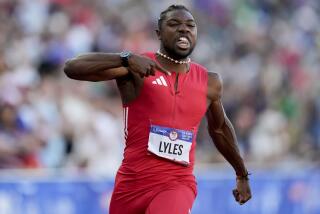He Is Stateless, So He Can Run : Ex-South African Plaatjes Allowed to Compete in L.A.
- Share via
Mark Plaatjes is no stranger to irony. When he heard that the announcement about his entering the Los Angeles Marathon would likely create controversy, Plaatjes had to smile.
“It does not surprise me at all,” he said.
He has been through it all before.
Plaatjes is a South African, or was until recently. Under international rules, South African athletes are not allowed to compete in the United States. But marathon officials announced Tuesday that Plaatjes and his wife and daughter had surrendered their South African passports and been granted political asylum in the United States. They will eventually seek citizenship here.
Plaatjes is of mixed ancestry. In the precise terminology of racially segregated South Africa, Plaatjes is called “colored.” Plaatjes acknowledges the paradox of a man who renounces his citizenship in a country where he has few of the rights granted white citizens. What rights will he now lose?
The irony for Plaatjes has been that the well-intentioned international prohibitions that keep South African athletes from competing against the rest of the world are also keeping nonwhites in South Africa from their chance.
Now Plaatjes has his chance. In a ruling that was made final Tuesday morning, The Athletics Congress, the governing body for track in the United States, has judged that Plaatjes is a stateless person and now eligible to compete here.
At that same moment, Plaatjes--whose best time in the marathon is 2 hours 8 minutes 58 seconds--suddenly became the favorite to win the men’s race. With his exceptionally fast time, Plaatjes expands the race’s elite field in a significant way.
In a press conference Tuesday, Plaatjes was given a TAC registration card and officially welcomed by marathon race director Bill Burke and Alvin Chriss, the special assistant to the executive director of TAC. Chriss, who in 1985 had ruled that Plaatjes could not run in the Boston Marathon, said that Plaatjes’ new stateless status has changed the runner’s eligibility.
The presence of Plaatjes, and other South Africans in races, is always a controversial topic. In Los Angeles, which serves as the Olympic trial race for three African nations, the thought of a South African running in the race had angered some.
Even though they are technically barred from doing so, South African runners have, for years, competed in road races and other competitions here. Some runners used false names or gave a false address when registering for TAC cards.
Chriss said the monitoring of these clandestine runners has been his No. 1 priority for the last four years.
There can be little controversy regarding Plaatjes in Los Angeles. This quiet man said he made the difficult decision to leave his homeland after much “brain bashing” with his wife, Shirley, and his adviser, Glenn Latimer. The Plaatjes family attended the press conference, and 3-year-old daughter Jene already looked like an American as she cradled a Barbie doll and made faces at her father.
Plaatjes and his family turned in their passports in January and have been living in Boulder, Colo., while he trains. Latimer said that Plaatjes, a physical therapist, has been offered a job in Illinois.
“They stepped off the plane with two suitcases and nothing else,” Latimer said. “Up until now, they have been surviving through the generosity of others.”
Latimer added that if Plaatjes won the Los Angeles Marathon, the $25,000 prize money would help to pay some of the fees for his immigration attorney.
Plaatjes, 26, joined the ranks of world-class marathoners after he ran 2:08:58 in May, 1985. But, because he’s from South Africa, Plaatjes has never had a chance to run against world-class competition. In 1976, the International Amateur Athletic Federation, the world governing body of the sport, voted to strip the South African track and field federation of its membership.
Because their federation is not a part of the IAAF, South African track athletes are forbidden from competing virtually anywhere in the world.
Plaatjes does not agree with the IAAF’s banning of South Africa because, “you are ostracizing people who are already ostracized.” Plaatjes no doubt has many impassioned things to say about apartheid.
His advisers are asking him not to speak out, mainly to protect his family still in Johannesburg. “I have five brothers and four sisters still there,” Plaatjes said.
When Plaatjes came to the United States, he landed in Athens, Ga., and competed for the University of Georgia’s track and cross-country teams. Plaatjes shakes his head and smiles at the memory.
“Even though it is not the most liberal place, compared to South Africa, it’s a 180-degree turn,” he said.
Track Coach Lewis Gainey recruited another South African, Shawn Nicholl, the year Plaatjes came to Georgia. School officials thought that by making the two South Africans roommates, it might ease the athletes’ adjustment to this country.
It turned out to be quite an adjustment. Nicholl is white.
“It was strange; Mark never really talked about the problems over there,” Gainey said. “But he did say to me once, ‘You know, at home, Shawn and I would not be allowed to be friends like this.’ I thought that was nice.”
Nicholl is now living in this country and is godfather to Plaatjes’ daughter.
More to Read
Go beyond the scoreboard
Get the latest on L.A.'s teams in the daily Sports Report newsletter.
You may occasionally receive promotional content from the Los Angeles Times.











